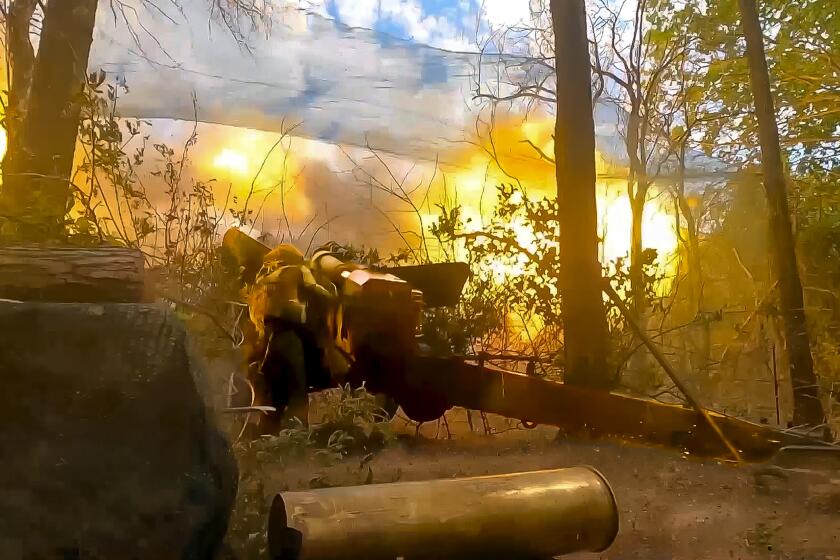Hijacking and Hostages: Israel’s Legacy in Lebanon
The TWA hijacking and an earlier hostage incident this month involving U.N. troops in southern Lebanon have a common backdrop--a continued involvement north of the border by an Israeli army that was officially withdrawn from Lebanon.
Israel’s determination to exercise military control over a piece of its northern neighbor’s territory, a so-called security zone extending up to 10 miles beyond the border, has been controversial here from the start.
It means supporting a Christian-dominated Lebanese militia as a proxy in the region--supplying it with money, arms and advisers despite the fact it is despised by the Shia Muslim majority who live in the area. It means maintaining an unspecified number of security agents in the zone. And it means free movement of regular Israeli army patrols back and forth across the border as a reminder that, whatever the maps say, Israel regards the area as Israeli in the military and security sense.
Critics of the concept have argued from the beginning that the security zone threatens to become a trap, drawing Israel back into Lebanon’s cycle of violence. Both the TWA hijacking and the U.N. hostage incidents, occurring within days of Israel’s “redeployment,” underscore the threat and demonstrate that it affects Israel’s standing with countries counted among its friends.
The key demand of the TWA hijackers is for the immediate release of 766 mainly Shia Muslim prisoners in Israel, most captured early this year in connection with “Operation Iron Fist” raids against southern Lebanon villages. The raids were in retaliation for guerrilla attacks against withdrawing Israeli troops and Israel has consistently linked the release of the prisoners to the security situation in the area.
The prisoners have not been convicted of any crime; according to the United States and the International Red Cross, among others, their transfer to Israel last April was in violation of Articles 49 and 76 of the 1949 Geneva conventions that prohibit the forcible transfer of civilians from their own country to the territory of an occupying power. The Shias are, in effect, Israeli hostages whose freedom Israel has made dependent on the good behavior of Israel’s Lebanese neighbors in the security zone.
Earlier this month, Israel was embarrassed when the South Lebanon Army backed by Israel took hostage 25 Finnish soldiers assigned to the U.N. Interim Force in Lebanon (UNIFIL) and then threatened to execute them at the rate of one an hour until its demands were met. Gen. Antoine Lahad, commander of the militia, said that Finnish UNIFIL soldiers had collaborated in the earlier abduction of 11 of his men, although a U.N. spokesman claimed that these men had defected to the rival Amal militia. Lahad insisted that the 11 would have to be returned before he would order the release of the U.N. troops.
Full details of the incident are still not clear, but Lahad, reportedly under Israeli pressure, released the last of his captives unharmed eight days after they were abducted. Nonetheless, as officials here admit privately, the affair could have been ended much more rapidly; but Israel didn’t want to be seen as undercutting Lahad, thereby undermining his credibility and Israel’s as well. As a result, Israel put itself in the position of appearing to condone a policy of kidnaping by its proxy army.
The affair seriously damaged Israeli-Finnish relations--and it had another effect. Norway’s chief rabbi, Michael Melchior, told the Jerusalem Post last week that thousands of Norwegian soldiers serving with the UNIFIL arrived in the region sympathetic to Israel but will leave “hating” it because of its backing for the Lebanese militia.
The TWA hijacking put a strain on Israel’s most important relationship--with the United States. Neither side wants to be seen as giving in to terrorism, and each seems to feel the other is being less than forthcoming in helping it to save face.
No one here suggests that Israel’s problems in Lebanon would all disappear immediately if Israel gave up on its security zone and truly withdrew to the international border. Understandably, Israel wants to put as much distance as possible between itself and the turmoil in Lebanon.
Ultimately, however, the Shia Muslim majority in southern Lebanon is the group with which Israel must cultivate some kind of understanding. Israel’s argument when it invaded Lebanon three years ago was with the Palestinians who had turned southern Lebanon into an armed base of operations, not with the Shias who were too weak at the time to resist Palestinian domination.
But the occupation lasted long after the Palestinians were gone, and the Shias, who originally welcomed the invasion, turned against Israel. Officials here say they have tried repeatedly to reach some agreement with the Shias, but that all overtures have elicited the same response: First pull out of Lebanon, then we’ll see.
There is a strong argument here that the risk is worth taking, since the Shias have proved in recent weeks to be as intent as the Israelis in keeping the Palestinians from returning to southern Lebanon. Shia leaders have said their battle for the Palestinian refugee camps in Beirut over the past month is really a battle for control of the south. And as much as the mainstream Shias have come to resent Israel, they appear to have little interest in inviting any punishing retaliation against Shia homes by allowing cross-border attacks into Israel from southern Lebanon.
“The current Lebanese reality clearly indicates that the Shias’ . . . resolution not to allow the PLO to re-establish itself and strike at Israel is firm,” the trade-union newspaper Davar wrote in an editorial here the other day.
An Israeli departure from the security zone would mean the risk of abandoning the Lebanese Christian militias friendly to Israel. It would also assume the risk that the more moderate Shia Muslims affiliated with the Amal political and military organization can hold their own against more radical elements such as the Hezbollah, inspired by Iran’s Ayatollah Ruhollah Khomeini.
Balanced against those risks, however, is evidence--the TWA and UNIFIL incidents--that the current policy is perilous indeed.
More to Read
Start your day right
Sign up for Essential California for news, features and recommendations from the L.A. Times and beyond in your inbox six days a week.
You may occasionally receive promotional content from the Los Angeles Times.






